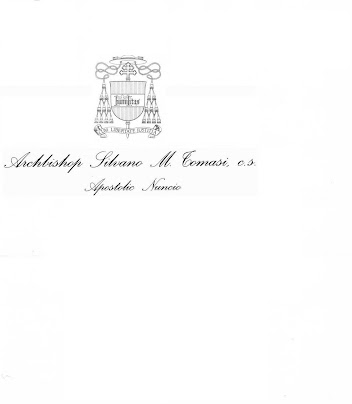Statement by H.E. Archbishop Silvano M. Tomasi, Permanent Representative of the
Holy See to the United Nations and Other International Organizations in Geneva,
at the Interactive Dialogue on Human Rights
of the 15th Session of the Human Rights Council
Geneva, 16 September 2010
Mr. President,
Please allow me to begin by thanking the Independent Expert for her Report on the issue of human rights obligations related to access to, and delivery of, safe drinking water and sanitation services and the responsibility of the participation of non-State service providers in this context.
The availability of fresh water has now become correlated more obviously to human rights like the right to life and health. While in the Millennium Development Goals (MDGs) the international community has set itself the goal of halving by 2015 the number of people globally without sustainable access to safe drinking water and basic sanitation, nearly 900 million people today continue to rely on unimproved water sources for their drinking, cooking and other basic needs. Today, approximately 2.5 billion people around the world—approximately half the developing world—are unserved by improved sanitation conditions. As a result, nearly 1.8 million children under the age of 5 die annually from diarrhoeal diseases (such as cholera, typhoid and dysentery) attributable to a lack of safe drinking water and basic sanitation options. Many other human illnesses can be traced back directly to the inadequate supply of fresh water for drinking and basic hygiene .
Many obstacles impede progress toward achieving the proposed goals, not least the inability of administrators to ensure a fair distribution of water resources in the peripheral areas and slums of large urban centres because of lack of funding or technical capacity. Poor people often suffer, not so much from a scarcity of water itself, but rather from the economic inability to access it . According to current and prevalent thinking, water primarily is regarded as a commodity, and its price should be based on the principle of profit. This concept is based on the theory that the cost of everything usable must be covered by the consumer, the one who pulls a utility from its use. Thus, in line with such thinking, even the poorest people should “pay” for access to the fifty liters of drinking water considered by the World Health Organization for minimal daily subsistence. But it is impossible today to talk about "common good", or about respect for fundamental human rights, without taking into account the right to live in a healthy environment. Water is a social, economic and environmental asset whose management must be based on social responsibility, a mentality of ecological behaviour and of solidarity within countries and globally. The dignity and wellbeing of the human person must be the central point of convergence of all issues related to development, environment, and water. It follows that access to water should be available to everyone now and in the future since without it people cannot be actors of their own development. In particular, everyone, including the poor, should be engaged in decisions and policy-making related to water management.
The fight against poverty and hunger requires more and more targeted interventions and solidarity in order to guarantee universal access to water for personal survival, health, and for the development of agriculture and the production of food. Thus the Catholic Church teaches that “by its very nature water cannot be treated as just another commodity among many, and it must be used rationally and in solidarity with others. The distribution of water is traditionally among the responsibilities that fall to public agencies, since water is considered a public good. If water distribution is entrusted to the private sector it should still be considered a public good…. Without water, life is threatened. Therefore, the right to safe drinking water is a universal and inalienable right”.
Mr. President, once again we state our appreciation for the Report presented to the Council. In conclusion, my Delegation would like to underscore the State’s and the private sector’s synergy and responsibility in sub-contracting water and sanitation services and in adopting targeted measures to reach the most marginalized; in developing research facilities for an efficient use of water in urban conglomerates and in agriculture; in controlling the use of chemical fertilizers for their impact on rivers and underground water bearing strata and the consequent dangers on health; in highlighting the cost efficient ways that the management and provision of water resources, water services and sanitation contribute in addressing the Millennium Development Goals.
Thank you, Mr. President.
Stemma Episcopale

Questo e lo Stemma Episcopale del ArciVescovo Mons. Silvano Maria Tomasi, missionario Scalabriniano. Lo stemma ricorda il patrono della congeregazione Scalabriniana voluto dal Beato G.B. Scalabrini, San Carlo Borremeo nel suo stemma ce questa scritta Humilitas.
venerdì 1 ottobre 2010
Iscriviti a:
Commenti sul post (Atom)

Nessun commento:
Posta un commento